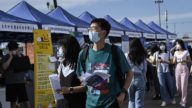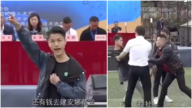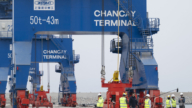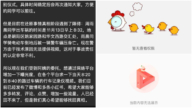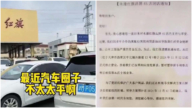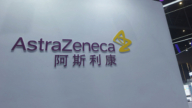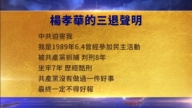【新唐人2011年8月4日讯】发生7.23追尾惨剧的甬温线动车及沪宁高铁,最近连续两天发生大面积延误,造成乘客恐慌,也使得中共当局企图降低公众对动车事故关注的努力白费。民间发誓要追问到底,而专家则表示,不讲科学,没有民主,这就是事件的根本原因。
在各大论坛上都能看见网友留下这句话:“从今天起,无论你把什么新闻放在头条,我都要在下面继续追问动车事故真相,是谁下令停止搜救,恢复通车的。铁道部是否把救人放在第一位,一定要如实回答。真相不揭,追问不止…。”
这是针对7月29号,中宣部对中国各大媒体发出的禁令。中宣部要求媒体对温州动车追尾,除正面报导和权威机构发布的动态消息,不再做任何报导、评论,并要求新闻网站降温,相关话题不准头版、不准置顶、不准推荐。
网友设计海报,讽刺这是中共给人们一个“胶带”,并开始自发的转发这个帖子。
不过,尽管当局急切的想给动车追尾事故降温,但发生7•23动车追尾惨剧的甬温线动车,以及沪宁高铁,在这一周连续两天发生大面积延误,让人想不追究也难。
8月1号下午,甬温线再现大面积停车。据多位网友通过微博透露,从1号下午14点30分左右起,温州南站就没有列车进站,一度出现大批旅客滞留。铁路部门事后解释是“临时设备维护”,但维护的是什么设备,为什么要在繁忙时段维护,却没有回答。
2号,上海《东方卫视》在温州南站现场报导说,甬温线动车大面积晚点事态仍在延续,周二起码有10多趟动车晚点,多则三四个小时,少则个把小时。
而沪宁高铁1号也传出故障停驶。上午8点由南京开往上海的G7003次动车,快抵达上海站时,突然停在轨道上不动达半小时,有乘客一度试图砸开车窗逃生,直到停驶的第27分钟才透过广播说明是“信号故障”,事故导致5趟列车误点。
根据公开资料,甬温线使用的是CTCS-2列控系统,由“中国铁路通信信号集团公司”设计研发。根据这家公司“客运专线列控系统技术平台”的详细说明,中国时速200到250公里的客运专线采用CTCS-2列控系统。
“中南大学”一名不愿具名的教授在接受《新唐人》采访时,对列控系统表示忧心。
“中南大学”王教授:“上海铁路局长安路生说了,信号设备遭雷击,设计有严重缺陷。这个问题已经很严重了,你设计有严重缺陷,你应该把那条线路都要停下来,把问题解决以后才通车。这是官员哪,我们都说,他为了他的政绩啊,就是乱搞。”
为什么中共购买多国的列车制造技术,但控制系统却坚持“国产”呢?
王教授:“它要体现它的自主知识产权,问题它又没有能力。就“大干、快上”了,中国的口号。但是你不能蛮干。”
王教授曾经致信国家发改委警告说:“我在给国家发改委的信里面都说了。科学与民主是国人一百多年来追寻的目标,但是至今仍很遥远。不讲科学,没有民主,这就是事件的根本原因。”
王教授表示,目前列控系统严重缺陷的“内因”,随时有可能被偶然的“外因”激发,而再次造成严重的事故。但中国的“官本位”使得设计人员有关安全性的警告,被一心只关心政绩的官员忽视,甚至不顾老百姓的生命。
新唐人记者常春、尚燕、周平采访报导。
High-Speed Train Paused Again
Recently, on two consecutive days,
major high-speed train delays occurred on Hu-Ning section
and Yong-Wen section, where the rail crash took place.
They caused passengers to panic and made the authorities’
effort to reduce public attention to the rail crash in vain.
The people swore to keep investigating to the end.
Experts said that the lack of science and democracy
is the root cause of the crash.
On all major online forums this message could be seen:
“From today on, whatever the headlines may be,
I will keep searching for the truth behind the train crash,
including who ordered to stop rescue and resume the traffic,
and whether the Ministry of Railways prioritized life-saving.
I will keep on investigating until we get the truth.”
This is against the ban issued on July 29 to all media
by the Propaganda Department on coverage of the crash.
All reports or commentaries were not allowed to be published,
except positive news or government news releases.
Websites must downplay the reports concerning the accident,
which cannot be headlined or recommended.
So, netizens designed and circulated a poster satirizing
the ban as a “duct tape” put on people by the CCP.
Although the authorities are eager to downplay the accident,
large-scale train delays occurred for two consecutive days
on the Yun-Wen section, where the crash took place
and the Hu-Ning section.
It is hard for the civilians not to investigate the causes.
In the afternoon of August 1
the Yong-Wen section again had a massive train delay.
Several netizens revealed on micro-blog that
no train entered the Wenzhou South Station since 2:30pm.
At one time, a large number of passengers were stranded.
The Ministry of Railways explained later that it was due to
a “temporary equipment maintenance”.
However, no explanation was given on what equipment
and why it was maintained in rush hour.
According to the live coverage by Shanghai Oriental TV
on August 2, the train delay continued on Yong-Wen section.
At least over 10 trains were delayed on Tuesday
for one hour to four hours.
On Hu-Ning section, a train stopped due to a breakdown.
The high-speed train G7300 from Nanjing to Shanghai
suddenly stopped on the track at 8 a.m. for half an hour.
Some passengers tried to break the window to escape.
Not until 27 minutes later, did the broadcast explain that
a signal failure had caused five trains to delay.
Public data show that the CTCS-2 train control system
employed by the Yong-Wen section was developed
by China Railway Signal & Communication Corp.
According to this company’s technical platform information,
all of China’s passenger train lines with speeds of
200-250 km/h have adopted the CTCS-2 train control system.
An anonymous professor of Central South University
told NTD that he worries about the train control system.
Professor : The chief of Shanghai Railway Bureau
An Lusheng said the signal equipment was struck by lightning
and there were serious design flaws.
This problem is very serious.
The design flaws should be investigated and corrected
before re-opening the section for traffic.
We all believe that what this official has done is
for his political achievements. This is irrational.
Why the authorities purchased the train manufacturing
technologies from various countries,
but insisted on using a “domestic” control system?
Professor: The government wants to show its
own intellectual property rights, but this beyond its capability.
So, it tried “a great leap forward”.
But you cannot work rashly.
The professor warned in a letter
to National Development and Reform Commission.
Professor: I said all this in the letter.
Science and democracy is the goal,
we Chinese have pursued for the past 100 years.
But so far they are still far away.
Lack of science and democracy is
the root cause of the crash.
The professor said that the “internal cause” of
the serious flaws of the train control system
could be triggered at any time by an accidental cause
and would create another serious accident.
However, China’s “officialdom” enabled the warnings
given by designers disregarded by the officials,
who only care about their political achievements
regardless of Chinese people’s lives.
NTD reporters Chang Chun, Shang Yan and Zhou Ping


